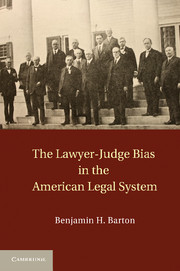Book contents
- Frontmatter
- Contents
- Acknowledgments
- 1 An Ambient Bias
- 2 The Theory
- 3 Constitutional Criminal Procedure
- 4 Civil Constitutional Law
- 5 A Short History of Lawyer Regulation
- 6 Current Lawyer Regulation
- 7 Torts
- 8 Evidence and Civil Procedure
- 9 The Business of Law
- 10 Enron's Sole Survivors
- 11 Complexity and the Lawyer–Judge Bias
- 12 Rays of Hope, Ramifications, and Possible Solutions
- Index
8 - Evidence and Civil Procedure
Published online by Cambridge University Press: 03 May 2011
- Frontmatter
- Contents
- Acknowledgments
- 1 An Ambient Bias
- 2 The Theory
- 3 Constitutional Criminal Procedure
- 4 Civil Constitutional Law
- 5 A Short History of Lawyer Regulation
- 6 Current Lawyer Regulation
- 7 Torts
- 8 Evidence and Civil Procedure
- 9 The Business of Law
- 10 Enron's Sole Survivors
- 11 Complexity and the Lawyer–Judge Bias
- 12 Rays of Hope, Ramifications, and Possible Solutions
- Index
Summary
More than a century of experience with the statutes has demonstrated that the [physician–patient] privilege in the main operates not as the shield of privacy but as the protector of fraud. … [The privilege] runs against the grain of justice, truth and fair dealing.
– Edward W. ClearyThe lawyer-client privilege serves a salutary and important purpose: to encourage full and frank communication between attorneys and their clients and thereby promote broader public interests in the observance of law and administration of justice.
– Southern Scrap Material Co. v. FlemingTHE ATTORNEY–CLIENT PRIVILEGE GUARANTEES THAT COMmunications between an attorney and client are not admissible in court. It is the oldest and most powerful evidentiary privilege and shields communications between lawyers and clients from disclosure in almost all settings. The attorney work product doctrine covers both the discovery process and admissibility in court. It gives limited protection to documents created in anticipation of litigation and absolute protection to the thoughts, opinions, and strategies of a lawyer preparing for trial. Between these two doctrines, lawyers are able to guarantee confidentiality to clients and prepare their cases for trial with little worry about what might or might not be discoverable by the opposing party. This is obviously a substantial selling point to clients and also makes every lawyer's job much easier.
- Type
- Chapter
- Information
- The Lawyer-Judge Bias in the American Legal System , pp. 189 - 208Publisher: Cambridge University PressPrint publication year: 2010



